There was a lot of anger in the Associate and Affiliate world as the T20 World Cup qualifiers were staged in Ireland and Scotland back in 2015.
Cuts were taking hold - budgets slashed, leading to fewer matches and tournaments, while the Big Three were not only taking more money, but also cutting opportunities, having just announced that the 50-over World Cup would be reduced to ten teams.
The ICC proclamations directed the smaller countries to T20 cricket, which was the future, with six places on offer for the 2016 event, which was to be held in India. The reality was that the six were actually just qualifying for another qualifier – competing with Zimbabwe and Bangladesh for a chance to join the ‘big boys’ in the tournament proper.
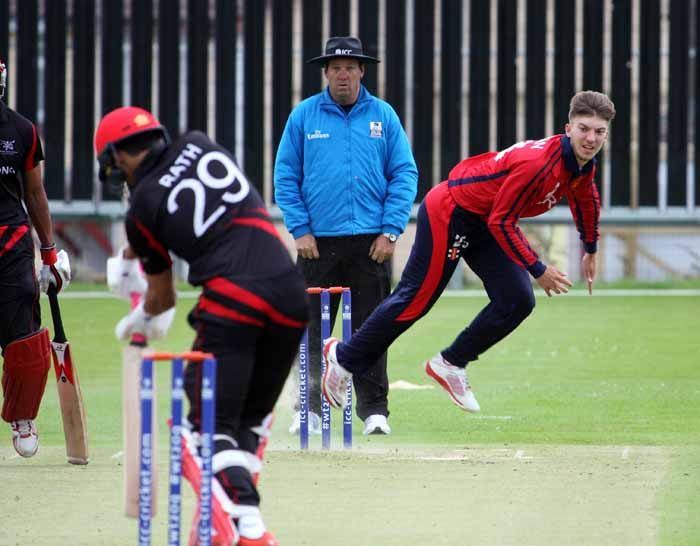 Ben Knyman bowling in Jersey's opening match win against Hong Kong (©CricketEurope)
Ben Knyman bowling in Jersey's opening match win against Hong Kong (©CricketEurope)
The format saw 14 teams – down from 16 in the previous edition – split across two groups. Ireland hosted Group A which included,Hong Kong, Jersey, Papua New Guinea, Nepal, Namibia and USA, while Group B saw Scotland joined by The Netherlands, Afghanistan, Oman, Kenya, UAE and Canada.
The Scotland group was troubled by bad weather and damp ground conditions at Stirling in particular, and with no reserve days it would prove a major factor.
The Afghans started brightly with a 32-run win over The Netherlands, while Scotland’s George Munsey hit 69 in a 9-wicket win against UAE. It was two out of two for Afghanistan on day two as Mohammed Shahzad’s brutal 74 eased them to an eight wicket win against UAE, while half centuries from Irfan Karim and Collins Obuya saw Kenya beat Canada convincingly and Oman narrowly. The big game saw the Dutch get back on track as Wesley Barresi and Peter Borren hit 50’s as they beat Scotland by 32 runs, despite five wickets from Ali Evans and 68 from Preston Mommsen.
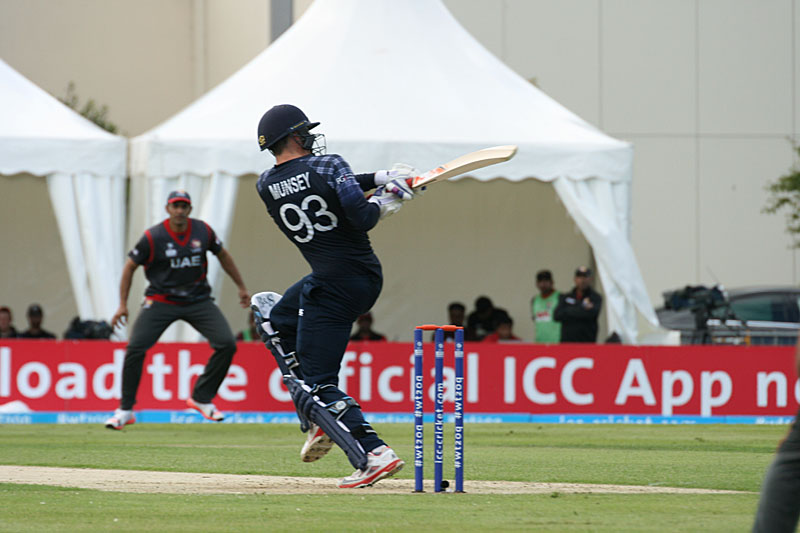 George Munsey during his 69 for Scotland against the UAE (©CricketEurope)
George Munsey during his 69 for Scotland against the UAE (©CricketEurope)
Scotland lost again to the Afghans as Mohammed Shahzad was again on top form as he hit seven sixes in a hard-hit 75. Zeeshan Maqsood hit 86 as Oman hammered Canada, while Ben Cooper’s 50 helped the Dutch ease to victory against UAE.
Afghanistan’s match with Kenya was washed out, while the Africans also lost heavily to Scotland. In the other games UAE’s Mohammad Shahzad 56 saw them beat Canada, while Oman stunned the Netherlands – Munis Ansari taking four wickets and Jatinder Singh hitting 65 not out.
Oman proved the result was no fluke as four wickets from Zeeshan Maqsood helped them to a 40-run win over leaders Afghanistan to open up the group. Scotland and The Netherlands both beat Canada convincingly to set up an intriguing last round of games in the group with five of the seven sides in with a chance of gaining the automatic qualification slot as group winners.
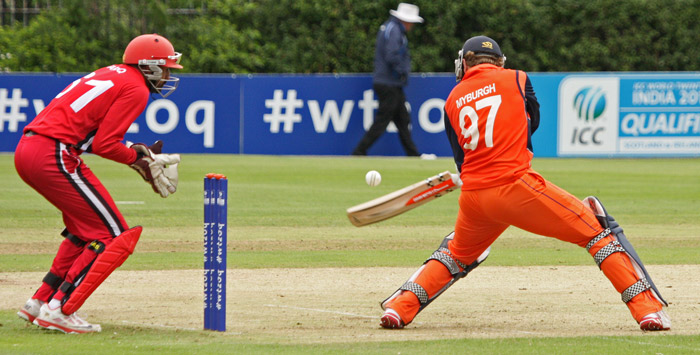 Stephan Myburgh batting during The Netherland's victory over Canada (©CricketEurope-Sander Tholen)
Stephan Myburgh batting during The Netherland's victory over Canada (©CricketEurope-Sander Tholen)
Afghanistan’s clash with Canada was abandoned without a ball bowled, much to their annoyance. The Netherlands dismissed Kenya for just 97 and chase in 8.3 overs to improve their NRR, but it was Scotland who pipped them by 0.06 on NRR as Kyle Coetzer scored another half century in a 23-run win against Oman.
In Ireland, the hosts were strong favourites, but this was a far from vintage Irish side, rebuilding in the post Phil Simmons era under new Head Coach John Bracewell. They got off to a winning start as the old heads of William Porterfield (56*) and Niall O’Brien (45) eased them to a seven wicket win over Namibia, while Gyendra Malla’s 52 saw Nepal beat USA with two balls to spare.
The first shock of the group came as Peter Gough’s 81 not out and 57 from Ed Farley saw Jersey stun Hong Kong by 9 wickets, while rain meant the Namibia versus Nepal match was abandoned. Papua New Guinea brought Jersey down to earth with a hard-fought win, while an efficient Ireland beat USA by 46 runs.
Ireland showed a more ruthless side as three wickets apiece from Kevin O’Brien and Stuart Thompson saw Nepal demolished for just 53, while Namibia’s Gerrie Snyman hit 5 sixes and 5 fours in his 62 from 35 balls as they crushed USA.
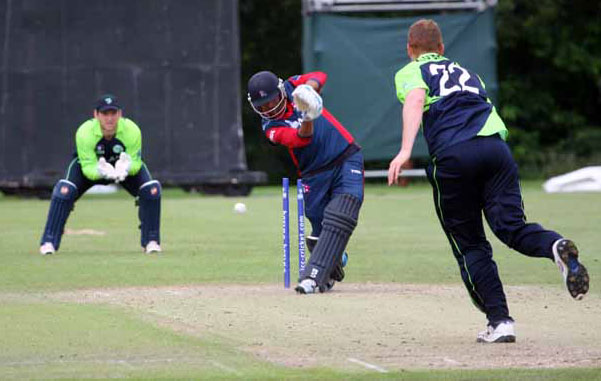 Two wickets in two balls for Kevin O'Brien as Ireland easily defeated Nepal (©CricketEurope)
Two wickets in two balls for Kevin O'Brien as Ireland easily defeated Nepal (©CricketEurope)
Norman Vanua was the Papua New Guinea hero as he hit four sixes to beat Ireland by two wickets at Stormont – needing 29 off 14 balls he took a liking to John Mooney’s slower ball bouncers to seal victory with 7 balls to spare! In the other game USA dismissed Jersey for just 87 to win by five wickets.
The group moved to Dublin and Ireland lost again to Hong Kong, this time by five runs in a strange chase in which skipper Porterfield got badly bogged down in making 28 off 40 balls – Irfan Ahmed’s 3 for 11 making him the HK match winner. Jonty Jenner hit 90 for Jersey but half centuries from Stephan Baard and Gerrie Snyman powered Namibia to a nine-wicket win, while Papua New Guinea overpowered Nepal by 8 wickets.
The penultimate round of games saw USA spring a surprise beating Hong Kong by seven wickets, while Jersey kept their hopes alive as they won against Nepal by the same margin. Papua New Guinea’s first chance to ensure top slot failed as they were well beaten by Namibia by 49 runs, with Stephan Baard once again in the runs and Bernard Scholtz taking four wickets.
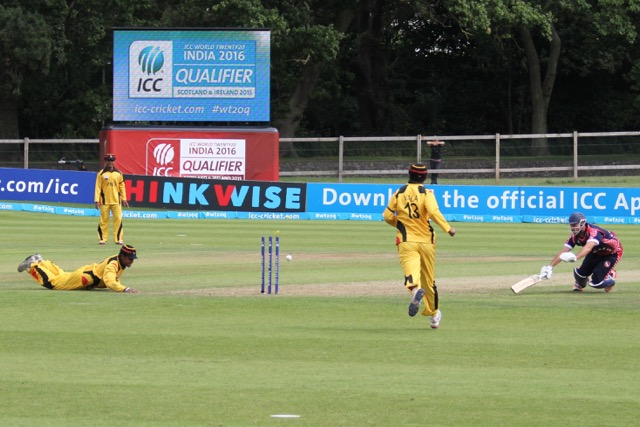 A close call in the match between USA and Papua New Guinea (©CricketEurope)
A close call in the match between USA and Papua New Guinea (©CricketEurope)
Papua New Guinea still had destiny in their own hands when they took on USA, but fluffed their lines as nerves played the part in their 18-run loss. That meant Namibia would top the group if they beat Hong Kong, but the Ahmed bothers ensured the Asian side won convincingly as Irfan hit 98 and Nadeem took five wickets. Ireland, who had beaten Jersey in the morning game thanks to Paul Stirling’s three wickets and 55 celebrated in their hotel as another World Cup berth was secured – although far from their best throughout.
Who would join Ireland and Scotland in India?
Hong Kong beat Afghanistan to clinch their place in what looked at first glance a last-ball thriller. However the game attracted the attention of the ICC anti-corruption unit who had been alerted by suspicious betting patterns and an investigation was launched. The findings were inconclusive but the questions remained. The Netherlands beat Namibia to seal the fourth slot, holding their nerve to chase down 135 with four balls and four wickets to spare.
That left two places with Afghanistan facing Papua New Guinea and Oman taking on Namibia in arguably the most high pressure games of the tournament – all or nothing for the four combatants.
Afghanistan came good when it mattered as Nowroz Mangal’s unbeaten 65 eased them to a six wicket win chasing a modest 127. Namibia were dealt a blow on the eve of their crucial clash with Oman as Jason Davidson was ruled out after ICC deemed his action to be illegal. He was one of four suspended during the tournament – Nizakat Khan (Hong Kong), James Ngoche (Kenya) and Ahsan Malik (Netherlands) the others.
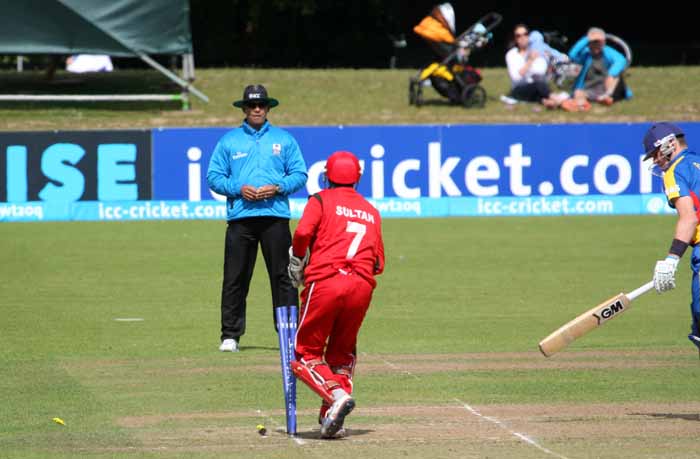 A stumping for Sultan Ahmed as Oman won against Namibia (©CricketEurope)
A stumping for Sultan Ahmed as Oman won against Namibia (©CricketEurope)
Oman duly won the battle by five wickets with an over to spare, as Zeeshan Ahmed’s nerveless half century ensured their first qualification for a major event.
With all the qualification places sealed, it felt a little bit a case of after the lord mayor’s show, but there was still the little matter of Associate bragging rights and the trophy.
Scotland were always in control of their semi-final as three wickets from Ali Evans, Rob Taylor and Safyaan Sharif restricted Hong Kong to just 116 – chasing in just 12 overs.
Ireland faced Netherlands hoping for revenge after their humiliation at the previous T20 World Cup in Bangladesh 16 months previously. They never came close to it as the batting never got out of second gear, with the exception of Kevin O’Brien who hit three sixes in a hard-hit 30. Mudassar Bukhari got four wickets in a MOM display, while Ben Cooper hit four sixes as the Dutch cruised to a five wicket win.
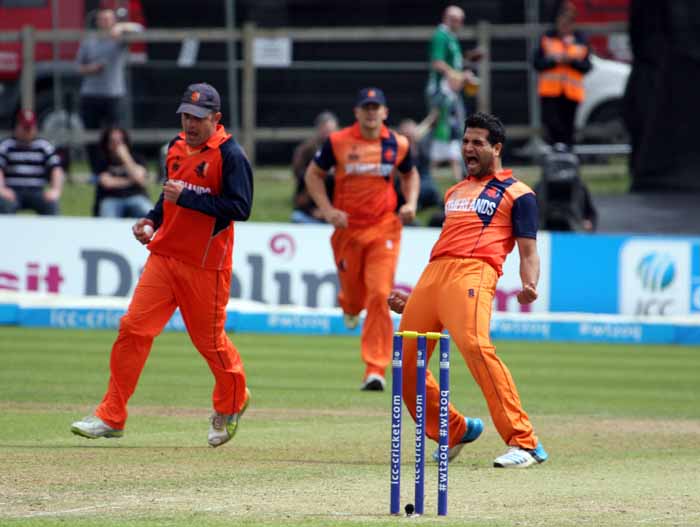 Mudassar Bukhari celebrates one of his four wickets for The Netherlands against Ireland (©CricketEurope)
Mudassar Bukhari celebrates one of his four wickets for The Netherlands against Ireland (©CricketEurope)
Finals days turned into a damp squib as torrential rain meant not a ball was bowled, with Scotland and The Netherlands sharing the trophy.
In his post-tournament review written at the time, CricketEurope’s Andrew Nixon summed up the event as follows.
On the face of it, from a cricketing perspective, the tournament was a good one. It was unpredictable - but not too unpredictable. It had the expectation defying performances of Oman, Jersey and the USA. It had the apparent decline in Twenty20 cricket of Nepal and the UAE. It had teams kept interested until the end of the group stage. It had some spectacular batting, bowling and fielding, and at the end the best six teams in the tournament did qualify. It also showed that associate cricket is more than just Afghanistan and Ireland.
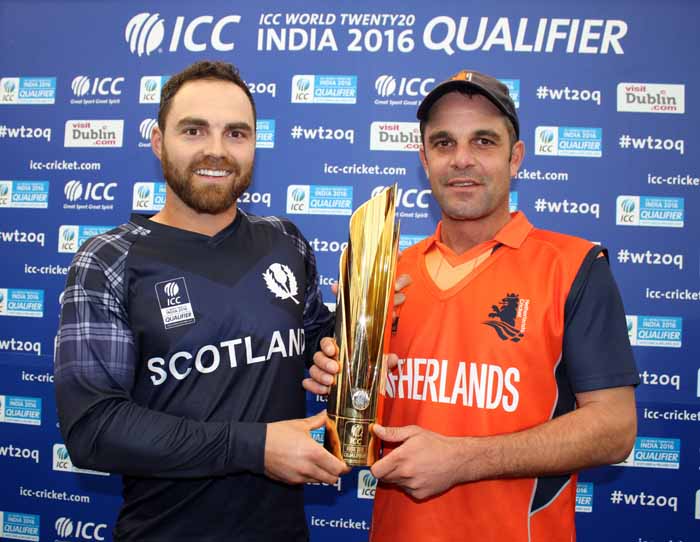 Captains Preston Mommsen and Peter Borren with the trophy (©CricketEurope)
Captains Preston Mommsen and Peter Borren with the trophy (©CricketEurope)
Following the tournament, Irish Coach John Bracewell was asked for his observations.
“First of all the Tournament itself, I think it’s ruthless. It’s probably one of the most ruthless things I’ve been involved with in terms of coaching, the consequences of losing for some of the Associates is just devastating to their whole economy of cricket and it’s a bit of a tell-tale sign when you see some of the CEOs dragging themselves around looking as if the world’s going to end and the players sort of taking that responsibility for cricket survival in some of these countries.
“So that to me was quite an interesting observation and as a consequence that puts a lot of pressure on the players to be able to perform. But equally I probably saw some cricketers here that I would have thought that, given a better environment say, if they’d been brought up in Australia in that cricket Environment some of them would be world-class no matter where they went, some really, really talented cricketers. Most teams had one or two of those players, some teams had three of them. That just shows you that if you make that investment you actually can get good cricketers out of anything and anywhere but you’ve got to create an environment that allows them to grow and prosper.
What positives would you pick out from an Irish perspective?”
“Our bowling! I think that we bowled to plans throughout, we bowled directly, we picked up wickets on average with our medium pacers one in every two overs. So we were aggressive with the ball, we were direct, we followed plans and I think our bowling kept us in the Tournament and obviously the next question is, ‘What was the disappointment?’ “Well the obvious disappointment was our batting. It was perceived as our strength, but I think our bowlers gained a lot of experience, someone like Craig Young played his first game in front of the camera and grew as the Tournament went on, became more confident and started to hit the wicket really hard and bowled direct so I was really pleased how our bowling game went but I was as equally disappointed, as was the team and the batters as to how they struggled on these surfaces.”
If you were marking Ireland out of ten what would you give them for this Tournament?”
“You’ve got to say that I think our bowlers were 10/10 and our batters were only 5.But we did the job that we wanted to do, that was to qualify first and foremost but equally we need to learn to be better against sides that we are fancied to beat and we need to be more ruthless about how we go about that business, more confident.
You know in some ways probably our batters were slightly overwhelmed by the pressure of having to perform 1: in front of their home crowd and 2: to expectation, which is the favourites tag. They’ve got to learn to be favourites and accept that tag and be confident with that tag as opposed to the underdog and then ‘nothing to lose’. You know that’s nice when you go to Tournaments and take on the big teams and things like that and that’s attractive but you know in order to make those big games we need to be top of the tree and sustain our own little 1st.”
Does it worry you as a new coach, is it going to be a bigger job than you thought? How many of these 15 will be in India?
“Oh you’re there or thereabouts with your side but you’ve also got guys like big Chase who’s coming back from injury, guys like that who can create a bit of a difference with their bounce, that creates an option. I like the way David Rankin strikes the cricket ball but he needs to score more. He’s a big boundary hitter but he needs to learn to score more between those boundaries.
It would be really nice to see a batter coming through from the domestic game, there’s a bit of work to do.I think also that we are actually increasing our depth, having talked to Peter Johnston who’s been with the side for a long time - he’s saying we could actually put out any of these fifteen we had here or sixteen with Andrew Poynter coming in and we would probably still have had a good side on the park that should win and that’s encouraging, that you’re not actually taking away guys to sit on their arse, you’re actually trying to pick your best team each time which is what we did.But equally your Andy McBrines and Graeme McCarters are guys who could come on to the park and perform and you could trust them to perform.”
We’ve gone with the ‘home-grown’ policy over the last decade, and had great success with the overseas players that have come here. Is that something you’re going to revisit or are you happy with the squad you’ve got?
“I’m happy for people to want to become Irish as long as they want to become Irish because that’s a commitment. I don’t see that as a mercenary field where you come in and it’s a ticket to get somewhere else. So you’ve got to make a commitment one way or another and that does due justice to those people who make the commitment here, who put in the time, who drive the miles to go to practice and put that in. I’m not a fan of the mercenary route, but if guys want to come here and play their cricket and really dedicate themselves to the Irish cricket situation then of course they can and they would be welcome and there’s no problems with that. But they’ve got to make that commitment, it’s not just a question of coming in for a Tournament and seeing where I go next.” Do you think the difficulties we had the last couple of weeks are confined to the T20 game or do you fear it could carry over into the longer one-day or four-day game?
“No I don’t at all. I think it’s more of an issue not of the type of cricket we’re playing, it’s more the pressure of being top-dog that they need to get over and that expectation. We need to lessen that pressure on the expectation, which is a reality of wanting to be Test cricketers.”

